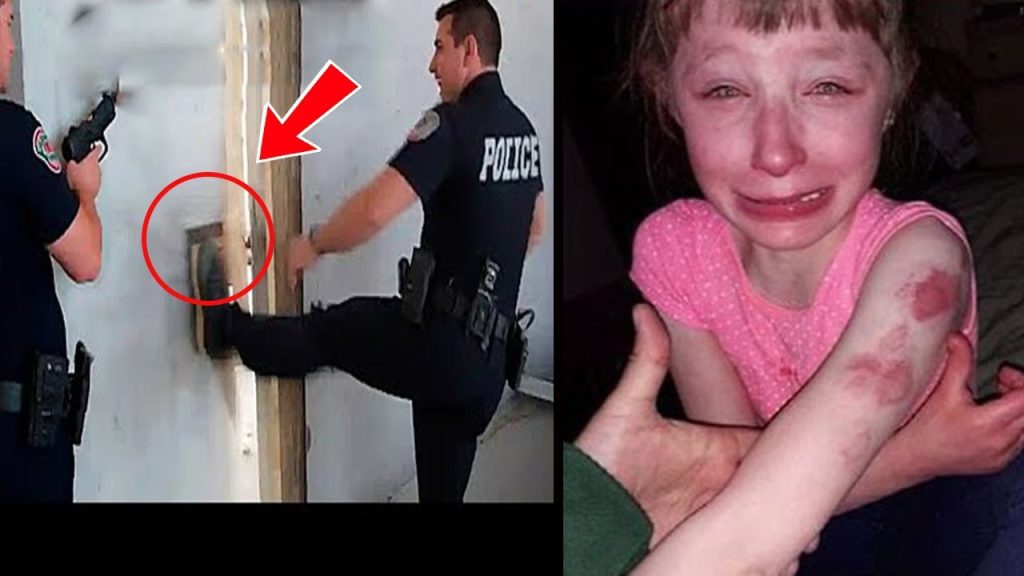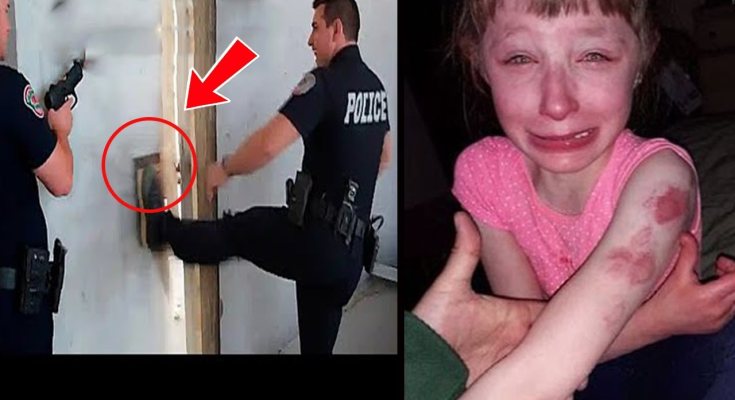The first lie was the silence. From the outside, the small, weathered house on the edge of town looked ordinary, its peeling paint and sagging porch telling a story of simple neglect, not monstrous secrets. When Officer Linda Miller and her partner knocked on the door, the quiet that answered felt wrong. It was too still, too deliberate. This was the kind of silence that hides things.
The call had come in as a routine child welfare check, prompted by an observant first-grade teacher, Miss Arnold. She had a gut feeling about 6-year-old Noah Reeves. The boy was pale, jumpy, and his big eyes seemed to hold a weight far beyond his years. He was always clutching a small, worn blue Lego piece as if it were a lifeline. Miss Arnold saw the faint, faded marks on his arm and knew she had to make the call.
When the door finally creaked open, a man in his mid-40s with wary eyes and a forced smile stood before them. “Noah’s fine,” Dennis Reeves insisted, his voice a little too tight. “He’s just quiet.” He reluctantly let them in. The house was unnervingly tidy, scrubbed clean of any personality or life. There were no toys scattered about, no family photos on the fridge, no life beyond the man standing guard in his own living room.
Linda knelt to speak to the small boy who appeared in the hallway. “Hi, Noah. I’m Linda,” she said gently. “Just wanted to check in. You okay?”
Noah nodded, his fingers tightening around the Lego block. But his eyes didn’t meet hers. Instead, they drifted upward, fixing on the ceiling.
“What’s up there?” Linda asked, her tone casual, masking the sudden tension coiling in her gut.
A long moment passed. The air grew thick. Then, in a voice so quiet it was almost swallowed by the silence, Noah whispered three words that would shatter everything.
“She’s up there.”
Dennis Reeves’ forced laugh was sharp and unnatural. “He’s got such an imagination,” he echoed, trying to steer the conversation away. But it was too late. Linda’s gaze remained on Noah, whose eyes were still locked on the ceiling. Every instinct she had honed over years on the force was screaming.
“Mind if we take a look?” Linda asked, her voice even but firm.
“There’s really nothing to—” Dennis began.
“I wasn’t asking,” Linda cut in, already moving down the hall, following Noah’s line of sight. There it was: a dusty, yellowing trapdoor. As she pulled the string, a ladder unfolded with a groan of protest. The smell hit her first—a foul mix of dampness, mold, and something else, something human and deeply wrong.
Climbing into the dim, suffocating space, her flashlight beam cut through the darkness. In the far corner, a shape moved. Linda froze. She raised her light, and her breath caught in her throat. It was a girl, impossibly thin, with tangled hair hiding a face pale from lack of sunlight. Her clothes hung from her frail frame, and a heavy chain was locked around her ankle, tethering her to a wooden beam. She didn’t scream or cry. She just stared, blinking against the sudden light as if it were a physical blow.
“Emily,” Linda whispered, though she didn’t yet know her name. “My name’s Linda. I’m here to help you.”
The girl’s dry, cracked lips parted. Her first words were not for herself. In a voice raspy from disuse, she asked, “Is Noah okay?”
The question punched the air from Linda’s lungs. Down below, her partner was already calling for medical assistance and backup. Dennis Reeves was being placed under arrest, his pathetic excuses about his wife’s wishes dissolving into the chaos. As Linda and her partner carefully carried the feather-light girl down the ladder, they wrapped her in a blanket. Only when the bolt cutters finally snapped the rusted lock on the chain did Emily let out a ragged breath she seemed to have been holding for years.
At the hospital, the true horror of her ordeal became clear. Emily, only 10 years old, was severely malnourished and traumatized. She had been officially withdrawn from school in the second grade, reported as “homeschooled,” and had vanished from the world. For three years, she had lived in that attic, her only contact with humanity the food her father occasionally brought and the secret visits from her little brother, Noah, who would slip her small treasures like the blue Lego piece. He told her they would use it to build a castle one day, a real one where they could both be safe.
While Emily began the slow, painful journey of recovery, Linda dug deeper. The family’s history was a quiet tapestry of isolation and control. Dennis had lost his job years ago, and soon after, Emily’s school attendance became erratic. Then, about a year before Emily’s rescue, her mother, Susan Reeves, had disappeared. Neighbors hadn’t seen her in months, and there was no paper trail—no bank activity, no employment records. It was as if she had ceased to exist.
Following a faint trail of whispers and records, Linda finally tracked Susan to a women’s shelter on the other side of town. She was living under an assumed name, a ghost of her former self, her face etched with fear and trauma. When Linda found her, she was hunched over a canvas, painting vague, gray shapes.
“Susan,” Linda said softly. “I’m a police officer. I’m here because your children are safe.”
The paintbrush clattered to the floor. Susan’s body began to rock as she choked back sobs. She, too, was a victim, trapped in a web of abuse and control until she had finally managed to escape, leaving her children behind in a decision that had clearly haunted her every moment since. She had been trying to build the strength to go back for them, terrified of what Dennis might do.
The rescue of Emily Reeves was not just about breaking a chain; it was about uncovering a darkness that had festered in plain sight. It was a story held together by the quiet bravery of a 6-year-old boy who refused to let his sister be forgotten, the intuition of a teacher who listened to her gut, and the determination of an officer who saw past the lies. For Emily and Noah, the path to healing would be long, but for the first time in years, they were no longer living in the dark. The silence had been broken, and hope, however fragile, could finally begin to find its voice.




